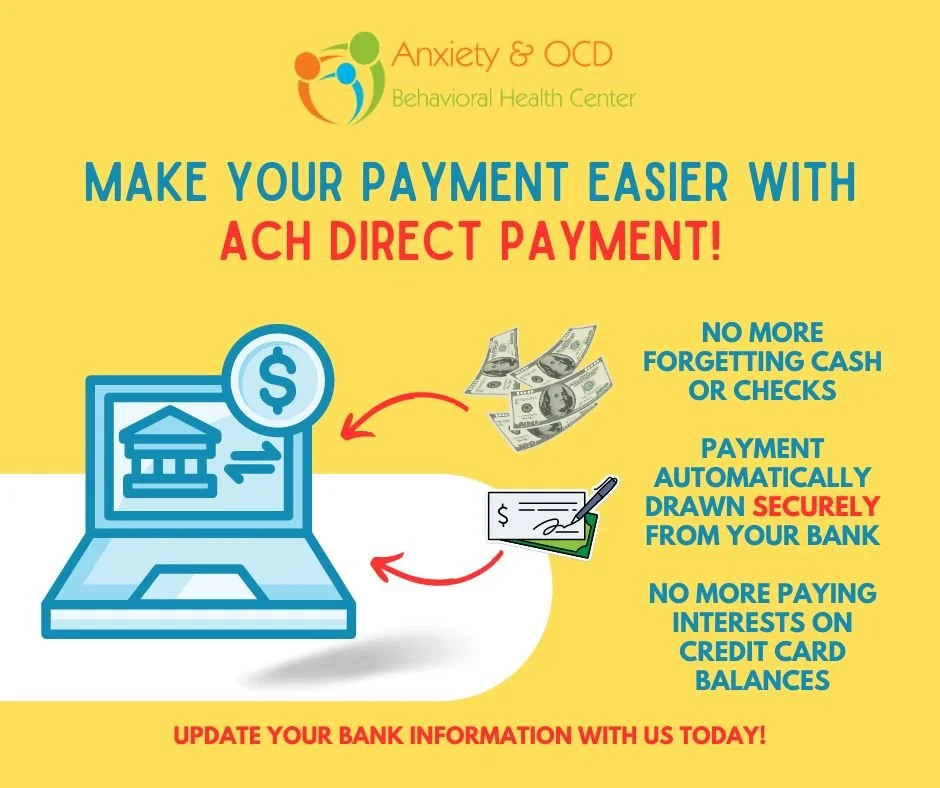Evidence-Based Therapy Services for Anxiety & OCD
At Anxiety & OCD Behavioral Health Center, we don’t do “generic CBT” or quick-fix coping tips. We provide specialized, evidence-based care designed to create lasting change. Our treatments are grounded in research and tailored to each individual — whether you’re a child, teen, adult, or parent.
Some sessions may even take place outside the office to practice real-world skills. We also offer secure telehealth sessions across Indiana and in PSYPACT states, so care is flexible and accessible.
Assessment: The First Step
Before beginning therapy, we start with a comprehensive assessment to ensure we fully understand your needs and can design the most effective treatment plan. Assessments typically span 1–3 sessions (60 minutes each). For patients transitioning from residential treatment, partial hospitalization (PHP), or intensive outpatient (IOP), a longer 3-hour assessment may be scheduled to support continuity of care.
During your assessment, we will:
Review practice policies and procedures.
Complete a comprehensive clinical interview.
Administer standardized assessment measures.
Explain our impressions of the problem.
Develop an initial treatment plan tailored to your goals.
We are meticulous about our intake process — and proud of it. The time we spend on the front end ensures treatment is targeted, evidence-based, and effective.
Our Services
-

Core Treatments
Exposure & Response Prevention (ERP) & Behavioral Activation
The gold standard for OCD, anxiety, and depression. ERP helps you face fears, resist compulsions, and build confidence in real-life situations. Behavioral activation reconnects you with meaningful activities and restores motivation.
Example: Touching a doorknob without washing or planning something joyful when motivation is low.Cognitive Behavioral Therapy (CBT)
A practical, skills-based approach to recognize and change unhelpful thought patterns. CBT teaches tools to reduce distress, build insight, and respond to challenges with flexibility.
Example: Challenging “what-if” thoughts before they spiral.Acceptance & Commitment Therapy (ACT)
A modern approach to living with more freedom and purpose. ACT helps you notice thoughts and feelings without judgment while taking action guided by your values.
Example: Allowing uncertainty—and still choosing what matters most. -

Skills Training
Executive Functioning Skills
For ADHD and related challenges, we teach practical strategies to turn intention into action—so tasks don’t just stay on your to-do list. Learn to organize what matters, manage time with clarity, make decisions with confidence, and follow through without burnout.
Example: Shrink big projects into doable next steps and use simple cues or reminders to make starting automatic, not overwhelming.Communication & Assertiveness
Build the kind of confidence that lets you speak up without apology. We help you find words that reflect your values—clear, kind, and firm—so you can set healthy boundaries and strengthen relationships without guilt.
Example: Practicing how to say “no” in a way that protects your peace and your connection.Distress Tolerance & Emotion Regulation
Emotions don’t have to run the show. Learn evidence-based tools to ride out big feelings, reset faster, and respond instead of react.
Example: Using grounding skills when anxiety spikes or calming strategies after conflict—so you bounce back with steadiness and self-respect. -

Family-Based Care
Supportive Parenting for Anxious Childhood Emotions (SPACE)
An evidence-based, parent-focused approach that helps reduce child and teen anxiety or OCD—without requiring the child to be in the room. Parents learn how to respond in ways that support courage rather than avoidance, creating lasting change in family dynamics. Through guided coaching and structured steps, families learn to replace reassurance and accommodation with calm, confident leadership.
Example: Learning how to respond when your child repeatedly seeks reassurance—without reinforcing the anxiety behind it.Parent Management Training (PMT)
A structured program that equips parents with practical strategies to manage challenging behaviors, set clear expectations, and build positive family communication. PMT emphasizes consistency, calm authority, and teamwork between caregivers. Parents learn to handle defiance, school refusal, or emotional outbursts with steady confidence—turning daily struggles into opportunities for growth.
Example: Responding to school refusal with clear, steady strategies instead of daily battles. -

Specialized Interventions
Repetitive Behaviors (BFRBs, Tics, Tourette’s)
Evidence-based care for trichotillomania (hair pulling), excoriation (skin picking), Tourette’s Disorder, and other tic-related conditions. Treatment focuses on awareness training, habit reversal, and building healthier replacement behaviors that give patients back a sense of control and relief.
Example: Practicing how to pause or replace hair pulling with a competing response—like clenching fists or using a fidget tool—when an urge arises.Trauma-Focused Therapy
Safe, compassionate therapy for processing trauma, rebuilding resilience, and restoring a sense of safety in your own body and mind. Sessions move at your pace—helping you understand your experiences without being overwhelmed, and learn coping tools that bring calm and control back into daily life.
Example: Gradually revisiting difficult memories in a secure environment while building skills to reduce nightmares, flashbacks, or hypervigilance. -

Flexible Care Options
Anxiety, OCD, ADHD, and related challenges don’t just appear in the therapy room — they show up in everyday life. That’s why we offer flexible, evidence-based care designed to meet patients where they are:
Telehealth – Secure, HIPAA-compliant video sessions available anywhere in Indiana and across PSYPACT states.
In-Office Sessions – Comfortable, confidential care at our Schererville and Chesterton offices.
Out-of-Office/Real-World Exposures – When appropriate, therapy can happen where anxiety lives — from school drop-offs to grocery aisles — so progress transfers to real life.
Intensive Formats – For patients needing faster results or extra support, higher-frequency or intensive sessions are available.
This flexibility allows us to deliver treatment that fits your life and helps you practice courage where it counts most — out there, in the real world.
Insurance and Fees
At AOBHC, we believe every patient should receive value for the time and money they invest in treatment. By working with experienced clinicians who provide out-of-network, evidence-based care, you and your therapist are free to focus on what works best for you — without the restrictions of insurance company rules.
Why Out-of-Network?
Out-of-network care means your treatment is not dictated by session limits, rigid structures, or “one size fits all” approaches. Together, you and your therapist can decide what’s most effective — whether that means longer or more frequent sessions, real-world exposures, or telehealth appointments. Research also shows that evidence-based therapy like CBT is cost-effective, often lowering overall healthcare costs compared to generic care.
Telehealth Coverage
Insurance coverage for telehealth may differ from in-office sessions. Please check with your insurance provider about your benefits for outpatient mental health care.
Reimbursement
Many patients use out-of-network benefits, HSAs, or FSAs to cover treatment. We provide detailed statements through your patient portal after every session, so you can submit claims promptly if you choose. Reimbursement is issued directly to you by your insurance company, based on your policy.
Fees and Payment
Fees are based on national standards, regional psychotherapy rates, and the specialty services provided. Fees are prorated in 15-minute increments for therapy, documentation, travel time (for community-based exposures), or professional consultation. Payment is due at the time of service.
Preferred method: ACH Direct Payment (secure, automatic). We take ACH rather than cash or checks.
Other accepted methods: debit/credit cards and HSA/FSA accounts.
Cancellation/No Shows
The full session fee is charged for missed sessions or cancellations made with less than 24 hours’ notice. These fees are not covered by insurance.
Good Faith Estimate
You have the right to receive a “Good Faith Estimate” explaining how much your care will cost.
Under the law, healthcare providers need to give patients who don’t have insurance or who are not using insurance an estimate of the bill for medical items and services.
You have the right to receive a Good Faith Estimate for the total expected cost of any non-emergency items or services.
Make sure your healthcare provider gives you a Good Faith Estimate in writing at least one business day before your psychotherapy service or item. You can also ask your healthcare provider, and any other provider you choose, for a Good Faith Estimate before you schedule an item or service.
If you receive a bill that is at least $400 more than your Good Faith Estimate, you can dispute the bill.
Make sure to save a copy or picture of your Good Faith Estimate.
For questions or more information about your right to a Good Faith Estimate, visit cms.gov/nosurprises or call the No Surprises Help Desk at 1-800-985-3059.



